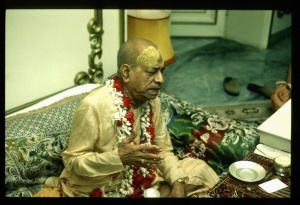CC Antya 1.170: Difference between revisions
m (1 revision(s)) |
(Vanibot #0054 edit - transform synonyms into clickable links, which search similar occurrences) |
||
| (One intermediate revision by one other user not shown) | |||
| Line 1: | Line 1: | ||
{{ | [[Category:Sri Caitanya-caritamrta - Antya-lila Chapter 01|C170]] | ||
<div style="float:left">'''[[Sri Caitanya-caritamrta|Śrī Caitanya-caritāmṛta]] - [[CC Antya|Antya-līlā]] - [[CC Antya 1|Chapter 1: Śrīla Rūpa Gosvāmī's Second Meeting With the Lord]]'''</div> | |||
<div style="float:right">[[File:Go-previous.png|link=CC Antya 1.169|Antya-līlā 1.169]] '''[[CC Antya 1.169|Antya-līlā 1.169]] - [[CC Antya 1.171|Antya-līlā 1.171]]''' [[File:Go-next.png|link=CC Antya 1.171|Antya-līlā 1.171]]</div> | |||
{{CompareVersions|CC|Antya 1.170|CC 1975|CC 1996}} | |||
{{RandomImage}} | |||
==== TEXT 170 ==== | ==== TEXT 170 ==== | ||
<div class="verse"> | |||
<div | :vidhur eti divā virūpatāṁ śata-patraṁ bata śarvarī-mukhe | ||
vidhur eti divā virūpatāṁ śata-patraṁ bata śarvarī-mukhe | :iti kena sadā śriyojjvalaṁ tulanām arhati mat-priyānanam | ||
iti kena sadā śriyojjvalaṁ tulanām arhati mat-priyānanam | |||
</div> | </div> | ||
| Line 13: | Line 16: | ||
==== SYNONYMS ==== | ==== SYNONYMS ==== | ||
<div class="synonyms"> | |||
<div | ''[//vanipedia.org/wiki/Special:VaniSearch?s=vidhuḥ&tab=syno_o&ds=1 vidhuḥ]'' — the moon; ''[//vanipedia.org/wiki/Special:VaniSearch?s=eti&tab=syno_o&ds=1 eti]'' — becomes; ''[//vanipedia.org/wiki/Special:VaniSearch?s=divā&tab=syno_o&ds=1 divā]'' — by daytime; ''[//vanipedia.org/wiki/Special:VaniSearch?s=virūpatām&tab=syno_o&ds=1 virūpatām]'' — faded away; ''[//vanipedia.org/wiki/Special:VaniSearch?s=śata&tab=syno_o&ds=1 śata]-[//vanipedia.org/wiki/Special:VaniSearch?s=patram&tab=syno_o&ds=1 patram]'' — he lotus flower; ''[//vanipedia.org/wiki/Special:VaniSearch?s=bata&tab=syno_o&ds=1 bata]'' — alas; ''[//vanipedia.org/wiki/Special:VaniSearch?s=śarvarī&tab=syno_o&ds=1 śarvarī]-[//vanipedia.org/wiki/Special:VaniSearch?s=mukhe&tab=syno_o&ds=1 mukhe]'' — in the beginning of evening; ''[//vanipedia.org/wiki/Special:VaniSearch?s=iti&tab=syno_o&ds=1 iti]'' — thus; ''[//vanipedia.org/wiki/Special:VaniSearch?s=kena&tab=syno_o&ds=1 kena]'' — with what; ''[//vanipedia.org/wiki/Special:VaniSearch?s=sadā&tab=syno_o&ds=1 sadā]'' — always; ''[//vanipedia.org/wiki/Special:VaniSearch?s=śriyā&tab=syno_o&ds=1 śriyā]-[//vanipedia.org/wiki/Special:VaniSearch?s=ujjvalam&tab=syno_o&ds=1 ujjvalam]'' — brilliant with beauty; ''[//vanipedia.org/wiki/Special:VaniSearch?s=tulanām&tab=syno_o&ds=1 tulanām]'' — comparison; ''[//vanipedia.org/wiki/Special:VaniSearch?s=arhati&tab=syno_o&ds=1 arhati]'' — deserves; ''[//vanipedia.org/wiki/Special:VaniSearch?s=mat&tab=syno_o&ds=1 mat]'' — of Me; ''[//vanipedia.org/wiki/Special:VaniSearch?s=priyā&tab=syno_o&ds=1 priyā]'' — of the dear one; ''[//vanipedia.org/wiki/Special:VaniSearch?s=ānanam&tab=syno_o&ds=1 ānanam]'' — the face. | ||
</div> | </div> | ||
| Line 21: | Line 23: | ||
==== TRANSLATION ==== | ==== TRANSLATION ==== | ||
<div class="translation"> | |||
<div | " 'Although the effulgence of the moon is brilliant initially at night, in the daytime it fades away. Similarly, although the lotus is beautiful during the daytime, at night it closes. But, O My friend, the face of My most dear Śrīmatī Rādhārāṇī is always bright and beautiful, both day and night. Therefore, to what can Her face be compared?' | ||
</div> | </div> | ||
==== PURPORT ==== | ==== PURPORT ==== | ||
<div class="purport"> | |||
This verse (''Vidagdha-mādhava'' 5.20) is spoken by Śrī Kṛṣṇa to Madhumaṅgala. | |||
</div> | |||
<div | <div style="float:right; clear:both;">[[File:Go-previous.png|link=CC Antya 1.169|Antya-līlā 1.169]] '''[[CC Antya 1.169|Antya-līlā 1.169]] - [[CC Antya 1.171|Antya-līlā 1.171]]''' [[File:Go-next.png|link=CC Antya 1.171|Antya-līlā 1.171]]</div> | ||
__NOTOC__ | |||
</div> | __NOEDITSECTION__ | ||
__NOTOC__ | |||
Latest revision as of 19:25, 19 February 2024

A.C. Bhaktivedanta Swami Prabhupada
TEXT 170
- vidhur eti divā virūpatāṁ śata-patraṁ bata śarvarī-mukhe
- iti kena sadā śriyojjvalaṁ tulanām arhati mat-priyānanam
SYNONYMS
vidhuḥ — the moon; eti — becomes; divā — by daytime; virūpatām — faded away; śata-patram — he lotus flower; bata — alas; śarvarī-mukhe — in the beginning of evening; iti — thus; kena — with what; sadā — always; śriyā-ujjvalam — brilliant with beauty; tulanām — comparison; arhati — deserves; mat — of Me; priyā — of the dear one; ānanam — the face.
TRANSLATION
" 'Although the effulgence of the moon is brilliant initially at night, in the daytime it fades away. Similarly, although the lotus is beautiful during the daytime, at night it closes. But, O My friend, the face of My most dear Śrīmatī Rādhārāṇī is always bright and beautiful, both day and night. Therefore, to what can Her face be compared?'
PURPORT
This verse (Vidagdha-mādhava 5.20) is spoken by Śrī Kṛṣṇa to Madhumaṅgala.